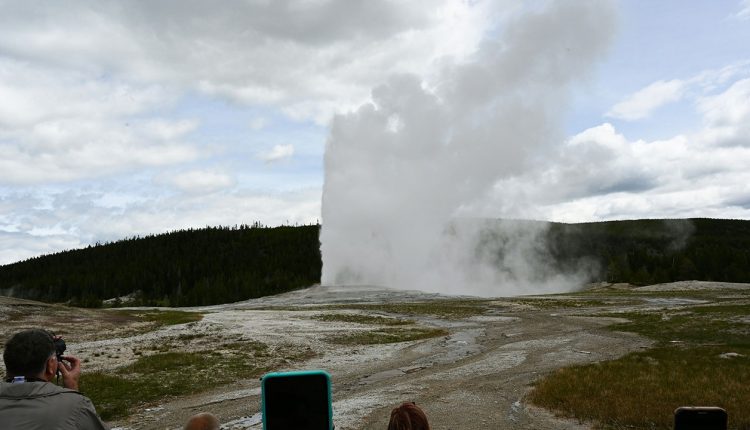The geyser Old Faithful was first documented and named on this day in history, Sept. 18, 1870, by the explorer Nathanial Langford.
Langford, who was exploring Yellowstone Park as part of the Washburn-Doane-Langford expedition, wrote in his journal that he had spotted a geyser that erupted quite frequently.
“It spouted at regular intervals nine times during our stay, the columns of boiling water being thrown from 90 to 125 feet at each discharge, which lasted from 15 to 20 minutes,” wrote Langford.
ON THIS DAY IN HISTORY, SEPTEMBER 17
“We gave it the name of ‘Old Faithful,’” he wrote.
A year later, in 1871, Old Faithful was once again spotted and documented by geologist Ferdinand V. Hayden, notes the United States Geological Survey website.
Hayden, who was the leader of the 1871 geological survey that led to the establishment of Yellowstone as a national park, wrote that “this geyser was named by Mr. N. P. Langford, and well sustains the reputation given it by the Doane and Washburn expedition of 1870. It has been called the Guardian of the Valley.”
He added, “It is so regular in its operations and they occur so frequently that it has afforded unusual facilities for observation.”
ON THIS DAY IN HISTORY, MARCH 1, 1872, MAJESTIC YELLOWSTONE BECOMES AMERICA’S FIRST NATIONAL PARK
Old Faithful in northwestern Wyoming remains a popular tourist attraction in the century and a half since it was discovered.
It receives about 4 million visitors each year, said the National Parks Service.
It is located in the Upper Geyser Basin in the southwest section of Yellowstone, says the National Park Service website.
“The geyser-viewing area is the most accessible and visitor-friendly in the park with bench seating, a large parking lot and a beautiful visitor center that tracks the time, height and length of an eruption to predict the next eruption,” says the National Parks Service.
True to its name, Old Faithful erupts on a semi-regular schedule each day.
Following each eruption, staff gets to work predicting the next time Old Faithful will blow.
Each eruption lasts anywhere from 90 seconds to five minutes, said the National Parks Service, and water can shoot as high as 180 feet in the air.
Following each eruption, staff gets to work predicting the next time Old Faithful will blow.
“These eruptions are predicted with a 90% confidence rate, within a 10-minute variation, based on the duration and height of the previous eruption,” said the National Parks Service.
“This is done by good old-fashioned observation, timing with a stopwatch and writing in a log book,” the Parks Service added.
Presently, Old Faithful erupts every 44 to 125 minutes, with an average interval of 74 minutes, says the National Parks Service.
That works out to about 20 eruptions per day.
And while Old Faithful has slowed down since its discovery, this is something tourists need not worry about, according to the experts.
“Prior to the 1959 earthquake, Old Faithful erupted 21 times per day,” said the National Parks Service.
“That’s a significant decrease in activity for geologists tracking each eruption, but to visitors seeing one or two eruptions … it looks just fine,” they said.
For more Lifestyle articles, visit www.foxnews/lifestyle
Read the full article here

